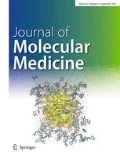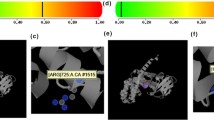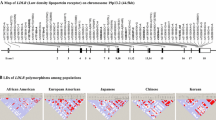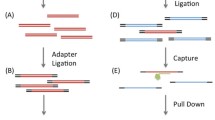Abstract
Seven single nucleotide polymorphisms (SNPs) of the peptidylarginine deiminase 4 (PADI4) gene have recently been reported to be strongly associated with rheumatoid arthritis in Japanese individuals. These SNPs are located in or close to exons 2–4 of PADI4 and are organized in at least four different haplotypes. However, a detailed sequencing-based characterization of the PADI4 gene in other populations is still lacking. We therefore analyzed exons 2–4 of the PADI4 gene in 102 healthy white Germans individuals by DNA sequencing and characterized new variants and haplotypes by a novel haplotype-specific sequencing-based approach. The haplotypes 2/3 (padi4_89*G, padi4_90*T, padi4_92*G, padi4_94*T, padi4_104*T, padi4_95*C, padi4_96*C), and haplotype 4 (padi4_89*G, padi4_90*T, padi4_92*G, padi4_94*T, padi4_104*C, padi4_95*G, padi4_96*T) conferring susceptibility to rheumatoid arthritis were detected at frequencies of 30.9% and 7.8%, respectively. In addition, three novel coding SNPs in exons 2, 3, and 4, and three SNPs in introns 2 and 3 located near the exon-intron boundaries were identified in 11 individuals (10.8%). The so-called nonsusceptibility haplotype 1 (padi4_89*A, padi4_90*C, padi4_92*C, padi4_94*C, padi4_104*C, padi4_95*G, padi4_96*T) occurred at a frequency of 58.3%. Additionally, we identified a closely related novel haplotype, haplotype 1B (2.9%), that differs from haplotype 1 only by padi4_92*G/padi4_96*C. This haplotype was not described in the Japanese population. Our results indicate that the PADI4 gene exhibits a remarkable variability and a rather complex haplotypic organization. Further studies on disease association of PADI4 should be performed by haplotype-specific sequencing-based approaches to identify the exact genotype of the PADI4 fragment of interest.


Similar content being viewed by others
Abbreviations
- PAD :
-
Peptidylarginine deiminase
- nPADI :
-
Nonsusceptibility haplotype
- sPADI :
-
Susceptibility haplotype
- PCR :
-
Polymerase chain reaction
- RA :
-
Rheumatoid arthritis
- SNP :
-
Single nucleotide polymorphism
References
Chavanas S, Mechin MC, Takahara H, Kawada A, Nachat R, Serre G, Simon M (2004) Comparative analysis of the mouse and human peptidylarginine deiminase gene clusters reveals highly conserved non-coding segments and a new human gene, PADI6. Gene 330:19–27
Senshu T, Kan S, Ogawa H, Manabe M, Asaga H (1996) Preferential deimination of keratin K1 and filaggrin during the terminal differentiation of human epidermis. Biochem Biophys Res Commun 225:712–719
Nakashima K, Hagiwara T, Yamada M (2002) Nuclear localization of peptidylarginine deiminase V and histone deimination in granulocytes. J Biol Chem 277:49562–49568
Tranquill LR, Cao L, Ling NC, Kalbacher H, Martin RM, Whitaker JN (2000) Enhanced T cell responsiveness to citrulline-containing myelin basic protein in multiple sclerosis patients. Mult Scler 6:220–225
Girbal-Neuhauser E, Durieux JJ, Arnaud M, Dalbon P, Sebbag M, Vincent C, Simon M, Senshu T, Masson-Bessiere C, Jolivet-Reynaud C, Jolivet M, Serre G (1999) The epitopes targeted by the rheumatoid arthritis-associated antifilaggrin autoantibodies are posttranslationally generated on various sites of (pro)filaggrin by deimination of arginine residues. J Immunol 162:585–594
Masson-Bessiere C, Sebbag M, Girbal-Neuhauser E, Nogueira L, Vincent C, Senshu T, Serre G (2001) The major synovial targets of the rheumatoid arthritis-specific antifilaggrin autoantibodies are deiminated forms of the alpha- and beta-chains of fibrin. J Immunol 166:4177–4184
Hill JA, Southwood S, Sette A, Jevnikar AM, Bell DA, Cairns E (2003) Cutting edge: the conversion of arginine to citrulline allows for a high-affinity peptide interaction with the rheumatoid arthritis-associated HLA-DRB1*0401 MHC class II molecule. J Immunol 171:538–541
Nielen MM, van Schaardenburg D, Reesink HW, van de Stadt RJ, van der Horst-Bruinsma IE, de Koning MH, Habibuw MR, Vandenbroucke JP, Dijkmans BA (2004) Specific autoantibodies precede the symptoms of rheumatoid arthritis: a study of serial measurements in blood donors. Arthritis Rheum 50:380–386
Yamada R, Suzuki A, Chang X, Yamamoto K (2003) Peptidylarginine deiminase type 4: identification of a rheumatoid arthritis-susceptible gene. Trends Mol Med 9:503–508
Suzuki A, Yamada R, Chang X, Tokuhiro S, Sawada T, Suzuki M, Nagasaki M, Nakayama-Hamada M, Kawaida R, Ono M, Ohtsuki M, Furukawa H, Yoshino S, Yukioka M, Tohma S, Matsubara T, Wakitani S, Teshima R, Nishioka Y, Sekine A, Iida A, Takahashi A, Tsunoda T, Nakamura Y, Yamamoto K (2003) Functional haplotypes of PADI4, encoding citrullinating enzyme peptidylarginine deiminase 4, are associated with rheumatoid arthritis. Nat Genet 34:395–402
Barton A, Bowes J, Eyre S, Spreckley K, Hinks A, John S, Worthington J (2004) A functional haplotype of the PADI4 gene associated with rheumatoid arthritis in a Japanese population is not associated in a United Kingdom population. Arthritis Rheum 50:1117–1121
Arita K, Hashimoto H, Shimizu T, Yamada M, Sato M (2003) Crystallization and preliminary X-ray crystallographic analysis of human peptidylarginine deiminase V. Acta Crystallogr D Biol Crystallogr 59:2332–2333
Acknowledgements
We thank Gisela Diederich for excellent technical assistance.
Author information
Authors and Affiliations
Corresponding author
Additional information
The nucleotide sequence data presented in this report have been submitted to the EMBL nucleotide sequence database and were assigned the accession numbers AJ715932–AJ715938. Regarding the localization of the exonic and intronic SNPs, their positions are based on the respective nucleotides in sequences NM_012387 and NT_034376.1.
Rights and permissions
About this article
Cite this article
Hoppe, B., Heymann, G.A., Tolou, F. et al. High variability of peptidylarginine deiminase 4 (PADI4) in a healthy white population: characterization of six new variants of PADI4 exons 2–4 by a novel haplotype-specific sequencing-based approach. J Mol Med 82, 762–767 (2004). https://doi.org/10.1007/s00109-004-0584-6
Received:
Accepted:
Published:
Issue Date:
DOI: https://doi.org/10.1007/s00109-004-0584-6




